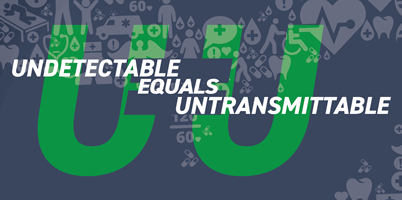The web Browser you are currently using is unsupported, and some features of this site may not work as intended. Please update to a modern browser such as Chrome, Firefox or Edge to experience all features Michigan.gov has to offer.
Undetectable = Untransmittable (U=U)
Undetectable = Untransmittable (U=U) means that a person with HIV who is on treatment (antiretroviral therapy or ART), has achieved an undetectable viral load and maintains it for six months and thereafter, cannot transmit HIV through sex.*
Viral load refers to the amount of HIV in a blood sample of a person with HIV. Most often, the higher the viral load, the greater the likelihood an individual with HIV will transmit HIV. ART must be taken as prescribed to achieve viral suppression and maintain untransmittable status.
 Undetectable = Untransmittable (U=U) Frequently Asked Questions
Undetectable = Untransmittable (U=U) Frequently Asked Questions
(Michigan Department of Health and Human Services)
- Undetectable = Untransmittable (U=U) website (Prevention Access Campaign)
- The Evidence for U=U (Undetectable = Untransmittable): Why Negligible Risk is Zero Risk (HIV i-Base/HIV Treatment Bulletin)
- Webinar: Demystifying U=U — Undetectable = Untransmittable (Michigan Department of Health and Human Services)
- HIV Treatment as Prevention (Centers for Disease Control and Prevention)
*During 2016, two key studies (PARTNER and HPTN 052) were released showing that individuals with HIV, who have undetectable viral loads, do not sexually transmit HIV to their HIV-negative partners.